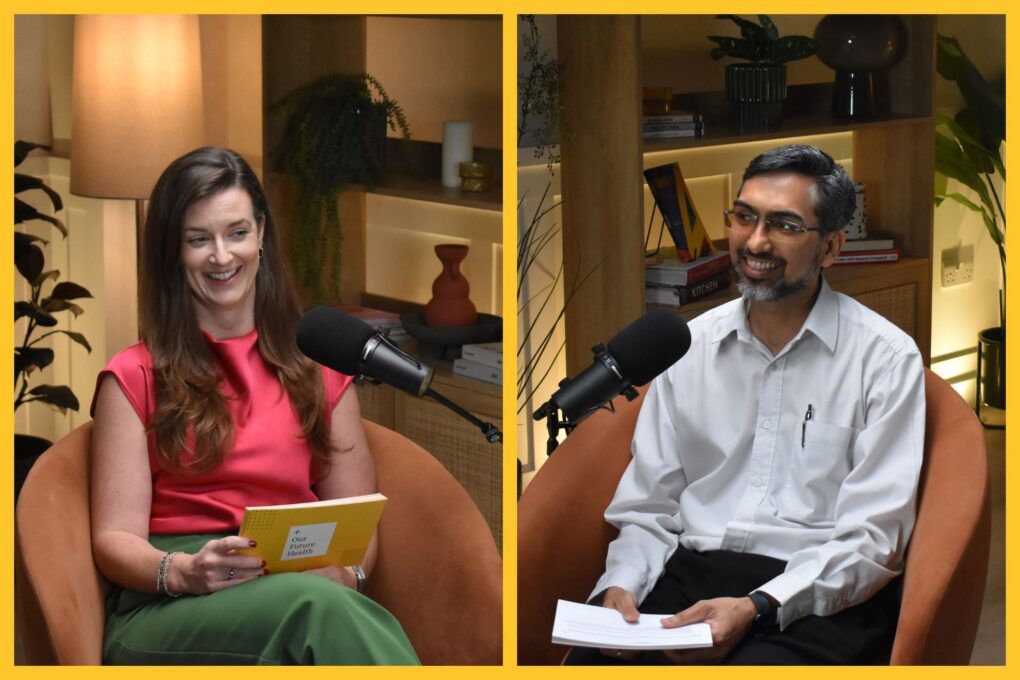Watch our first ever live Q&A event for volunteers
Last month, we held our first ever live online event for Our Future Health volunteers.
We invited volunteers in the West Midlands area to hear from our Chief Executive and Chief Medical Officer Dr Raghib Ali OBE, and our Executive Director of Ethics, Compliance and Governance, Fiona Maleady-Crowe.
Raghib and Fiona delivered an update on our programme. They also explained why we believe we can help researchers to improve health outcomes in the West Midlands, where the rate of premature deaths from preventable causes is above the national average.
Almost 1,000 people tuned in for the webinar. Attendees submitted more than 500 questions for the Q&A section of the event – testament to the curiosity and commitment of our volunteer group.
Our first studies and how we keep your data safe
Many webinar attendees were keen to hear about how researchers are studying Our Future Health data.
Raghib shared updates on some of the studies that are already analysing our data. He spoke about researchers who are looking into the effect of shift work on asthma, the impact of vaping on chronic disease, and how physical activity relates to mental health.
“These observational studies will be followed by intervention trials, giving participants personalised health insights and opportunities to take part in targeted follow-up research, if they wish to,” said Raghib.
The session also answered questions about how we keep our data safe.
“All participant data is stored in a secure Trusted Research Environment,” Fiona explained. “It’s an environment that researchers can go into to look at the data.
“Anyone wanting to do so must undergo a rigorous access application process and will only be able to view de-identified data for approved and ethically sound projects that demonstrate how they will benefit public health.
“Our data is never sold to insurers or private entities. We all work extremely hard to make sure that it’s only used by the researchers who have followed the approved path to access it, no-one else.”

Future health insights
Volunteers also asked about if and when they might start receiving personalised health feedback.
“Information will soon begin to be shared with volunteers, starting with insights about heart disease and diabetes in 2026, followed by cancer and dementia,” said Raghib.
“Gathering and interpreting this information takes time. We really appreciate our volunteers bearing with us as researchers work to develop new ways to prevent, detect, and treat diseases.
“Support systems also need to be coordinated with the NHS before results are returned, ensuring clinical follow-up where necessary, without placing extra pressures on the system.”
Improving healthcare together – for good
Raghib and Fiona closed the session by thanking our 2.5 million (and counting) volunteers.
“We are really very grateful to all of you who have joined our programme so far. It takes time, it takes effort, and you’ve placed your trust in us to look after your data. Volunteers like you are everything to Our Future Health – thank you.”
Afterwards, we asked attendees for feedback. The response was overwhelmingly positive, with nine out of ten people reporting that they enjoyed the event.
We’re now planning more webinars for our volunteers in the future, with each focussing on a different region of the country. We will email invites to volunteers in each region as we go.

Let’s prevent disease together
By volunteering for Our Future Health, you can help health researchers discover new ways to prevent, detect and treat common conditions such as diabetes, cancer, heart disease, stroke and Alzheimer’s.